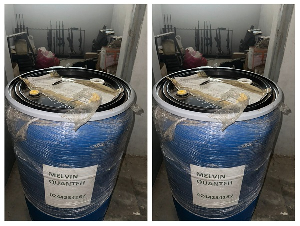Most often, we cry out loud with disappointment about how the many project-works of students have gathered dust on the shelves of academic institutions and are not translated into viable business ideas to address a need in our societies. Well, someone in fact, a young lady has changed the status quo.
In this week’s B&FT’s Inspiring Startups, read how Aba transformed an assignment she was given in school into a practical business idea that has come to solve a need in society.
Millicent Aba Tetteh was born in Kumasi, Ashanti Region of Ghana. She is a graduate of the Ghana Institute of Journalism, where she obtained a degree in public relations and completed in 2016.
The beginning of her entrepreneurial journey is quite an interesting one. It all began in 2015 while in university. Her class was given an assignment to prepare a brief about a company. The assignment required that they choose a company and write how they could rebrand it and improve on the services or goods it delivers.
While all her friends chose big companies to use for this project, Aba wanted to do something different. She chose to rebrand her mother’s business and guess what kind of business her mother did? She sold foodstuffs in the market. Aba worked on how she could make her mother’s business better through delivery and packaging, and presented it to the lecturer. Well, it won her very good grades and she thought of translating it into a real business plan after school.
So, when she completed university in 2016 Aba wasted no time trying to search for job; she decided to continue what she had started as a project work.
Foodstuffhome gets to work
Aba named the business Foodstuffhome, and immediately implemented the project work she started in school. She created social media accounts for the business and started with a walk-in service whereby customers would come to her shop themselves and pick up the items they pre-ordered. Quite soon, she added a home delivery service whereby a dispatch rider takes products straight to the client at a place of his or her convenience.

The idea behind this is to make life comfortable for people so that they do not go through the hustle and bustle of going to a market to get good foodstuff for themselves. She has in stock all kinds of foods—cassava, plantain, yam, meats, fresh and dried fish, fruits, vegetables, snails, mushrooms and many more.
As the business grew, she introduced another unique service: foodstuff hampers as gift items for occasions such birthdays, Christmas and other parties – and people love the concept.
Foodstuffhome accepts payment after delivery and that gives clients the opportunity to inspect the foods before they pay.
Another unique thing about Foodstuffhome is that clients can get their order within an hour of request, based on the proximity and what they requested for. The company has gained the trust of clients so well that, about 100 clients contact within a month. To get regular supply of good food stuff, Aba and her team works directly with farmers and other reliable suppliers they trust.
Again, they also package food stuff for people travelling outside the country and want to take local foods along.
Presently, the startup also exports foodstuff outside the country to the United States, United Kingdom and other parts of Europe.
Vision
Aba’s vision for Foodstuffhome is to expand it and make it a one-stop door-to-door delivery service where the foods will be in a delivery van and moved from place to place to get them closer to customers.
Challenges
The first challenge she encountered was the acceptance rate. When she began, it was difficult to convince people to buy food stuff they have not personally seen and selected. But with time, as they realised the benefits of a hassle-free shopping and with Aba also making sure all products delivered are in good condition, people started giving it a chance.

Another challenge she still grapples with is location. Even though there is Ghana Post GPS and google map which have come to lessen the frustration of finding the location of people, the challenge still remains with people who are not tech savvy.
How education has helped
For someone who studied public relations, she has appreciated the benefits of branding and good communication. These are the two main things that have won her the trust of many customers and they find it easy to communicate with her.
Again, through this job, she has learned a lot about foods and their seasons. As a result, she knows how to plan ahead for stock, what prices to sell at, and how to preserve them well.
How government should assist startups
For Aba, there are many brilliant business ideas locked up in the minds of people due to lack of capital. So, she says, government should widen the scope of its support systems to make funds easily accessible to startups so that many jobs will be created.
Again, she feels entrepreneurship should not only be taught in the university. It should start right from basic school so that from infancy, people will consider it among their options when choosing careers in life.
Advice to the youth
“Once you are determined and hardworking, you will achieve whatever you want to achieve. So, my simple advice to the youth is that they should be determined and hard-working in life.”













